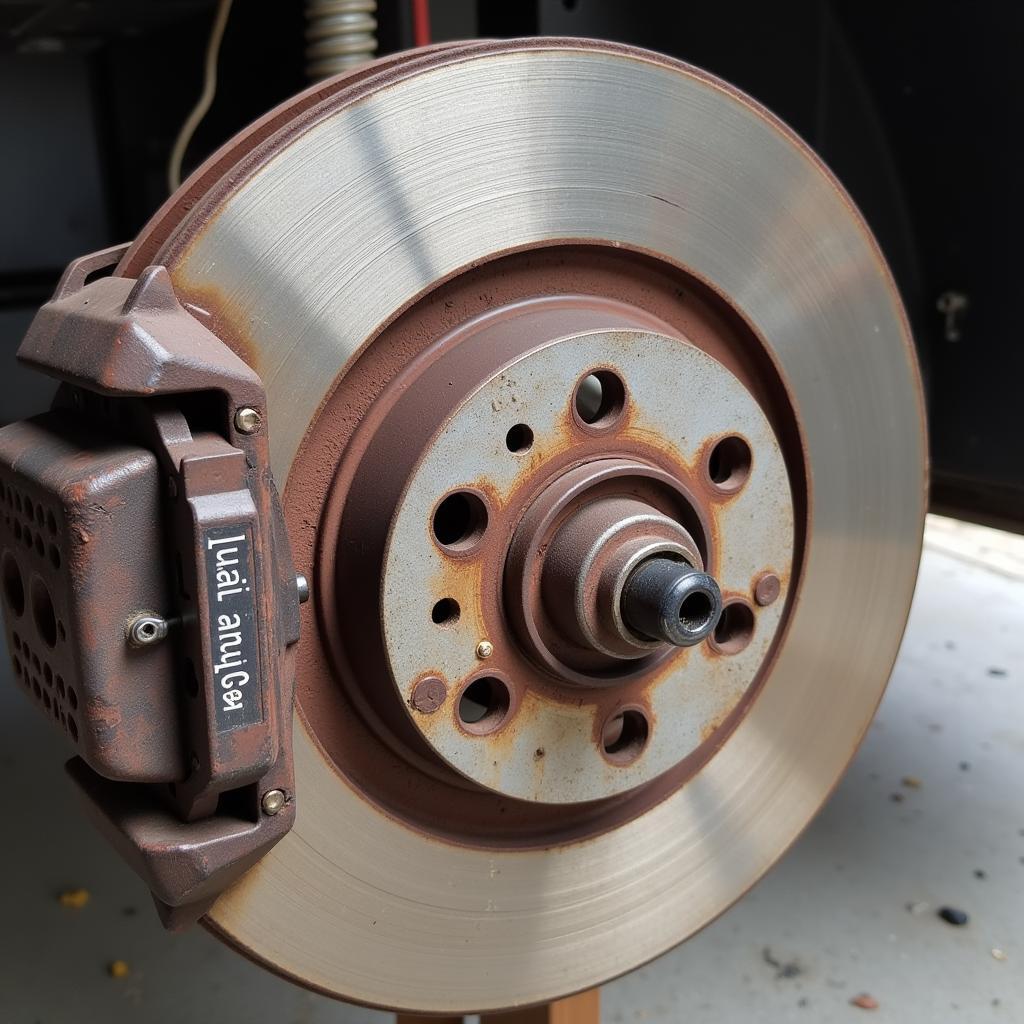A bent car wheel can significantly impact your vehicle’s performance and safety. Many drivers wonder, Can A Bent Car Wheel Be Fixed? The answer isn’t always straightforward and depends on several factors, including the severity of the damage, the type of wheel, and the repair method used. Understanding these factors will help you make the best decision for your car. You can often find solutions for uncomfortable car seats or even learn how to fix a bent car tire bead with the right resources.
Modern vehicles are complex machines, and even seemingly minor damage, like a bent wheel, can have far-reaching consequences. A bent wheel can cause vibrations, uneven tire wear, and even difficulty steering, potentially leading to dangerous driving conditions. Knowing whether to repair or replace is crucial, both for your safety and your wallet. For those experiencing issues with their car’s suspension, knowing can the suspension of a car be fixed is crucial.
Understanding Bent Wheel Damage
Bent wheels, also known as buckled or warped wheels, occur when the wheel’s circular shape is distorted. This usually happens due to impacts with potholes, curbs, or other road hazards. The severity of the bend can range from a slight wobble to a noticeable deformation. Even a minor bend can compromise the wheel’s integrity and affect its ability to hold air pressure and support the vehicle’s weight.
Types of Wheel Damage
Wheel damage can manifest in various ways, including:
- Cosmetic Damage: Scratches, scuffs, and paint chips, affecting only the wheel’s appearance.
- Minor Bends: Slight deviations from the true circular shape, often causing vibrations.
- Major Bends: Significant deformations, potentially leading to tire leaks, handling issues, and brake problems.
- Cracks: Structural damage compromising the wheel’s integrity, requiring immediate replacement.
Can a Bent Wheel Be Repaired?
Yes, in many cases, a bent car wheel can be repaired. The feasibility of repair depends on the type of wheel (steel or alloy) and the extent of the damage. Minor bends in steel wheels are often easily repairable. Alloy wheels, while generally more susceptible to damage, can also be repaired, but the process is more complex and requires specialized equipment. Sometimes, you might need to consider how much is it to fix axle on car if the axle is also affected.
Repairing Steel Wheels
Steel wheels are generally more durable and easier to repair than alloy wheels. Minor bends can often be straightened using specialized hydraulic presses. This process involves applying pressure to the affected area to reshape the wheel.
Repairing Alloy Wheels
Repairing alloy wheels is a more intricate process that involves heating and reshaping the metal. This requires specialized equipment and expertise. While many shops offer alloy wheel repair, it’s essential to choose a reputable shop with experienced technicians. For severe bends or cracks, replacement is often the safest option. If your rim is significantly bent, knowing car rim bent how to fix will be helpful.
When to Replace a Bent Wheel
While many bent wheels can be repaired, there are situations where replacement is necessary:
- Severe Bends: If the bend is too significant, repairing it may compromise the wheel’s structural integrity.
- Cracks: Cracked wheels cannot be safely repaired and must be replaced.
- Extensive Corrosion: Corrosion can weaken the wheel, making it unsafe to repair.
“A severely bent or cracked wheel is a serious safety hazard,” warns John Smith, a certified automotive technician with over 20 years of experience. “In such cases, replacement is the only option to ensure the safety and stability of your vehicle.”
Signs of a Bent Wheel
Several signs indicate a potentially bent wheel:
- Vibration in the steering wheel or vehicle: This is often the most noticeable sign.
- Uneven tire wear: A bent wheel can cause the tire to wear unevenly.
- Pulling to one side: The vehicle may pull to one side while driving.
- Loss of tire pressure: A bent wheel can damage the tire bead, leading to air leaks.
- Visible damage to the wheel: Look for dents, bends, or cracks in the wheel.
“Regular wheel inspections are crucial for identifying potential problems early on,” advises Jane Doe, a senior automotive engineer. “Catching a bent wheel early can save you money and ensure your safety.”
Conclusion
So, can a bent car wheel be fixed? The answer often is yes, especially for minor bends in steel wheels. However, the complexity and cost of repair can vary depending on the type of wheel and the extent of the damage. Always consult with a qualified technician to determine the best course of action. For severe damage, replacement is usually the safest and most cost-effective solution in the long run. Contact AutoTipPro at +1 (641) 206-8880 or visit our office at 500 N St Mary’s St, San Antonio, TX 78205, United States for expert advice and assistance with your bent wheel concerns.
FAQ
- How much does it cost to fix a bent wheel? The cost varies depending on the type of wheel, the extent of the damage, and the repair shop.
- Can I drive with a bent wheel? Driving with a bent wheel is not recommended as it can compromise safety and cause further damage.
- How can I prevent my wheels from bending? Avoiding potholes and curbs, and maintaining proper tire pressure can help prevent bent wheels.
- Is it better to repair or replace a bent wheel? This depends on the severity of the damage. Consult with a qualified technician for advice.
- What are the signs of a bent wheel? Vibrations, uneven tire wear, pulling to one side, and visible damage are common signs.
- How often should I check my wheels for damage? Regularly inspecting your wheels, especially after hitting a pothole or curb, is recommended.
- Do bent wheels affect alignment? Yes, bent wheels can affect wheel alignment and should be addressed immediately.





Leave a Reply